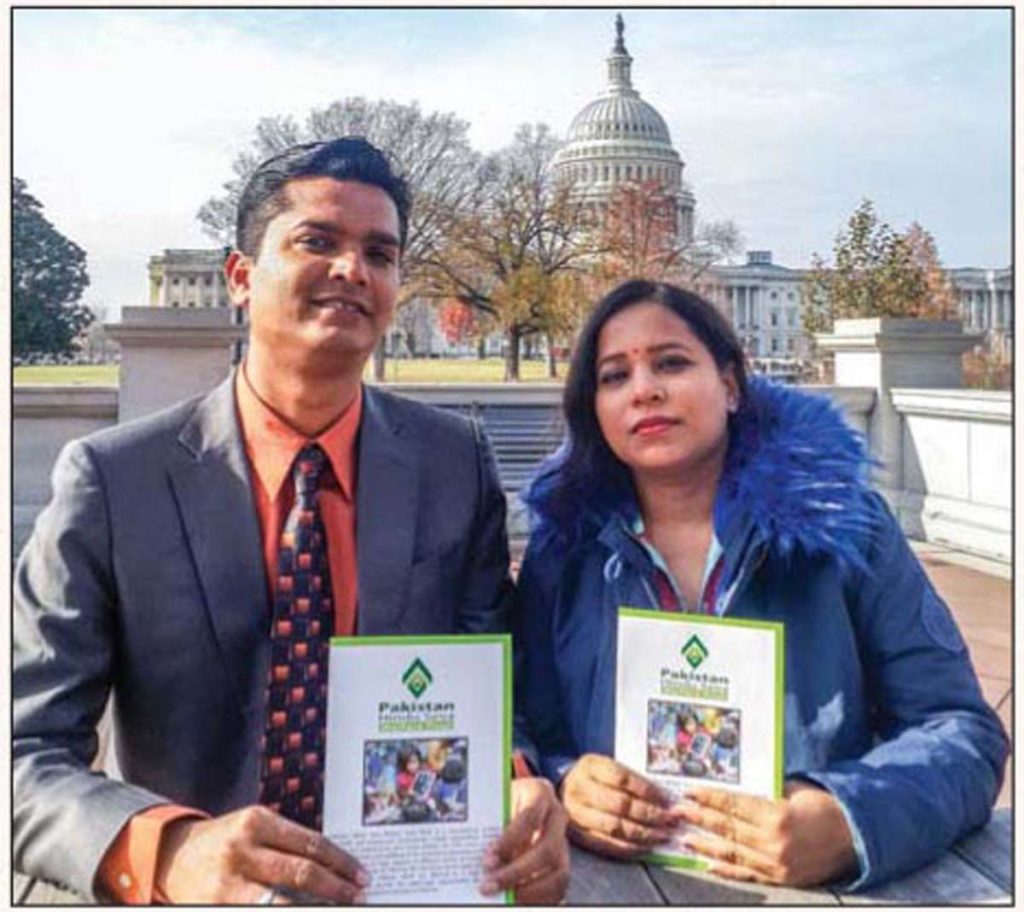Couple reports progress on some fronts, though many issues remain for the nation’s Hindus
By Lavina Melwani, New York
In december, 2016, sanjesh dhanja and his wife Kiran Kumari were hosted by the Hindu American Foundation for a US tour to enhance awareness of issues faced by Hindus in Pakistan. In 2009 these two tireless human rights workers co-founded the Pakistan Hindu Seva Welfare Trust (PHS, www.pakistanhinduseva.org), a charity organization whose mission is to create a peaceful Pakistan, free from discrimination and to strengthen human values through opportunities for minorities and deprived communities. Dhanja, the president of PHS, says, “Our goal is secular, not political: to work for education, health and human rights in Pakistan, largely for the millions of deprived Hindus there.”

The current estimate of Hindus in Pakistan is 1.9 million. This is considered low. The long overdue national census in 2017 should provide higher numbers, if one includes Dalits, who will instead be designated as a separate religion even though the vast majority practice Hinduism. Says Dhanja, “Just about 2% are in the middle class, and at least 90% are very poor. Many are from scheduled castes. About 8% of the Hindus are wealthy, in business or serving in the legislature. Though they represent the entire Hindu community, they don’t always support poor Hindus. We need funds to help this poor population.”
Kiran Kumari, secretary of PHS, explains the disappearance of Pakistan’s Hindus: “Some converted, some migrated and some lost their lives in various crises. Some Muslim groups do try to pressure Hindus to convert. We are working to resist this. Educated Muslims do not want Hindus to leave their faith. Because their strength is with us, we are able to raise our voices.”
PHS works on a broad array of fronts: burial and cremation matters for Hindus, an education center in Karachi, bringing the community closer by organizing cricket tournaments and preventing vandalization of temples. In 2014 six Hindu temples were attacked. Dhanja shares, “We believe every religion is a good religion,” and the challenge is to teach Hindus about their faith in an Islamic nation.
“Ours is a painful story,” confided Dhanja. “With no laws protecting Hindus, there is no access to justice. But there is some change today. We are trying to create awareness of our society, for we, too, are part of Pakistan. ” Kiran reports that at least 25 new cases of rape and forced conversion are registered every month, mostly in the poverty-stricken interior of Sindh. These include forced conversions and “love jihad,” where girls are compelled to convert in order to marry Muslim men who use social pressure to take advantage of women’s poverty.
If poor Hindus cannot feed their family, conversion can seem attractive. Ten percent of the girls convert willingly, but the majority are compelled. Dhanja and Kumari have led protests against forced conversions and even rescued two girls. Threatened because of this activism, they focus now on societal issues for minorities.
“Health, education and women’s empowerment are the next phase of our work, and these will alleviate the problem of forced conversions,” says Dhanja. “We want to teach the tenets of the Hindu faith to our children and want our Hindus to be aware of their religion so they won’t convert out of duress; if they do convert, it will be after a thoughtful process.”
“In every religion, people try to teach the tenets of their faith to their children from birth, but this does not happen with Hindus in Pakistan,” she noted. “We live in a society which does not allow us to learn about our own faith.”
Ninety percent of Hindus are bonded laborers and receive no education. Says Dhanja, “The hate material in the school textbooks is not good for our children. What is falsely written about non-Muslim minorities needs to be corrected.” PHS holds Bhagavad Gita quiz challenges for young Hindus to teach them a correct view of Hinduism.
Working with the government and with other NGOs, the couple are seeing incremental changes. In 2017 the government made some changes in the school textbooks, and included chapters on Hindu festivals like Diwali, Holi and Navratri. The government has given Hindus plots to build new temples. Cremations, disallowed in many Islamic countries, are available to Pakistani Hindus. Yoga is better accepted; there is even a popular yoga program on television. In 2016 the government announced holidays on Diwali and Holi for the Hindu community. “Also,” Dhanja adds, “68 years after Independence, Hindu marriage is now recognized under the law, but only in Sindh. We hope it may become law on a national level in the future.”
Travel for Hindus to India is also easier now. “We get visas to go to India, and this year a group of 90 Hindus traveled to India for a yatra. We went to Vrindaban, Rishikesh, Haridwar and also the Akshardham temple in Delhi,” states Kiran Kumari.
Dhanja would like Hindus from India to come and visit the pilgrimage spots in Pakistan, such as the ancient Shiv Temple in Chatwal, where Shiva’s first tear had fallen and become a pond. He says, “The very name Hindu comes from the Sindhu River in Sindh. We should be very proud of that.” Dhanja concludes, “We Hindus live together with the Muslims, who are very good neighbors. Extremism is the only problem we face.”
The couple see Pakistan as the home of all its citizens. “Our work is for all Pakistanis: we are working for the larger community. We work to benefit all humanity in Pakistan, not only the Hindus. We have to live in Pakistan—we are born of the soul of that country! Pakistan is our vatan, our homeland. We are facing the problems of the country together—we would not want to leave but rather stay and solve the problems we face together.”
